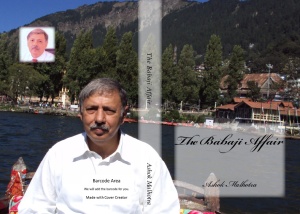 At the present time our world has various types of people based on their religious beliefs or disbelief. First there are the atheists who do not believe that there is any significant higher power in the world than that possessed by humans. There is another category of atheists that admit to the possibility that there might me more advanced life forms on other planets in the universe considering the immense vastness of the universe and some might be more powerful or intelligent, further ahead in evolution, but there is no God, although perhaps the very advanced life forms may be called god-like or gods.
At the present time our world has various types of people based on their religious beliefs or disbelief. First there are the atheists who do not believe that there is any significant higher power in the world than that possessed by humans. There is another category of atheists that admit to the possibility that there might me more advanced life forms on other planets in the universe considering the immense vastness of the universe and some might be more powerful or intelligent, further ahead in evolution, but there is no God, although perhaps the very advanced life forms may be called god-like or gods.
Some affirm their faith in only what has been ascertained by science so far. However many of these latter persons are themselves not scientists and do not have a complete understanding of science or the extent of its present reach. As regards the scientists themselves, many are/were firm believers in God including Einstein. Theists or those who are not atheists are of several types. First, there are persons who belong to a religion, not just notionally because their parents belonged to that religion, but who have themselves affirmed faith in that religion as adults.
There are a variety of religions on our planet ranging from the mainstream religions of the majority to the fringe religions of a minority. Aside from followers of religions there are also theists i.e. those who believe in God, who do not belong to any religion at all i.e. they believe in God but do not conform to any one of the existing religions. They may however accept some parts of one or more religions and develop their own independent system of beliefs based on their personal experience and knowledge of different religions, philosophy and even science. These last may be called independent theists. I for one belong to this last category at heart although officially I am a Hindu. Fortunately Hinduism does permit much freedom and a wide variety of beliefs so that I am not a pariah when amongst the Hindus or when participating in any of their ceremonies or rituals.
An independent theist is like an independent professional. He may rise to great heights in the practice of his or her profession or sink into virtual nothingness. Another professional who belongs to an organization has the support and safety of his or her organization. It is so with independent theists too. Freed from the shackles of an organized system of beliefs they may attain a profound understanding of the universe, as did the founders of many religions on our planet, or they may sink into foolishness and ignorance.
There is an old saying in Buddhist literature (Dhammapada) as well as Christian one (the Ecclesiastes) that a fool is to that extent wise that he knows he is a fool, but a fool who considers himself wise and his knowledge complete is indeed a fool. Independent theists must always be on guard that they do not sink into this last category. On the other hand a person belonging to an organized religion may suffer some from the erroneous beliefs and practices of his religion but if he begins to disbelieve in some of them, while not walking out of his religion, he or she may miss the full spiritual benefit that faith or religion has to offer.
An independent theist has the advantage that he or she can choose what appeals to their heart from the teachings of different religions. Thus one who believes mainly in Christian teaching may also believe in reincarnation, a belief that perhaps existed in the original teachings of that religion, or another belonging to an eastern religion benefit greatly from the Sermon on the Mount.
Independent theists who attained great heights in their spiritual quests are the founders of religions that exist on our planet. In my opinion they had a far greater understanding of spiritual matters than those who came after them to form religious organizations or to interpret the message and the words of the founder, and even when some of the messages of the founder are properly interpreted, there are mistakes at our end in further interpreting or understanding them That humans make errors in this process is without doubt a certainty. If they did not they would not be human as the old adage summarizes – to err is human. By definition there is only one power or being in the universe that is completely error free and that is God.
After having written a blog post entitled the independent theist elsewhere- http://someitemshave.blogspot.com – some years ago, this author wondered what others may have thought on the subject and looked up the search terms ‘independent theism’ and ‘independent theist’ on Google. Most results that turned up were of the blog post. It seems that terminology had not been used much. However another closely allied term was found called philosophical theism at wikipedia that meant nearly the same, although not quite because the former i.e. independent theism can function perhaps best with silence because that is what the language of God is but the latter functions with logic, debate and argument. You may read more about that definition at http://en.wikipedia.org/wiki/Philosophical_theism was:
“Philosophical theism is the belief that God exists (or must exist) independent of the teaching or revelation of any particular religion. It represents belief in a personal God entirely without doctrine. Some philosophical theists are persuaded of God’s existence by philosophical arguments, while others consider themselves to have a religious faith that need not be supported by rational argument.”
And
“Philosophical theists may accept arguments or observations about the existence of God advanced by theologians working in some religious tradition, but reject the tradition itself. (For example, a philosophical theist might believe certain Christian arguments about God while rejecting Christianity.) Philosophical theism conceives of nature as the result of purposive activity and so as an intelligible system opens to human understanding, although possibly never completely understandable. It implies the belief that nature is ordered according to some sort of consistent plan and manifests a single purpose or intention, however incomprehensible or inexplicable.”
Independent theism is the belief that God exists independent of the teaching or revelation of any particular religion. It represents belief in one unique God of the universe. Some independent theists may be persuaded of God’s existence by philosophical or scientific arguments, while others may consider themselves to have a religious faith that need not be supported by argument or tradition.
Independent theism may reject all or part of the tradition itself. It may accept the possibility of existence of God through scientific insights of scientists or merely through intuition in love and silence. Freed of the percepts of organized religion, by default, independent theism may view nature and universe as a visible facet of God and not just a creation of God. It implies love of all life and nature since that is a part of God. Independent theists are free to vary from this definition in details since that is what independent theism implies – being free of any prescribed dogma or preexisting definition while professing belief in God who has the limitless love, intelligence and power of the infinite universe.
Independent theism may view God in everything and everything in God, although individual life forms as distinct from the inanimate world have the freedom to harbor ego, desires, and ignorance too. Any part of the universe that does not have this individual freedom or free will is therefore not a life form but a part of the inanimate world.
Many In the modern age ranging from scientists to common citizens, Sufi saints,  even some Christian ones like Edgar Cayce, Robert Llewlyn as well as some Himalayan Mystics are independent theists. My recent book – The Babaji Affair is a story of some such Himalayan Mystics.
even some Christian ones like Edgar Cayce, Robert Llewlyn as well as some Himalayan Mystics are independent theists. My recent book – The Babaji Affair is a story of some such Himalayan Mystics.
Independent Theism frees a person from possible shortcomings and in some cases even exploitation that may enter a religion with the passage of time while permitting him or her to establish a relation with God or the Universal Consciousness, leaving him or her free to pursue what must be the most fundamental goal of religion best described in the words of Albert Einstein,
A human being is a part of the whole, called by us “Universe,” a part limited in time and space. He experiences himself, his thoughts and feelings as something separate from the rest—a kind of optical delusion of his consciousness. The striving to free oneself from this delusion is the one issue of true religion. Not to nourish it but to try to overcome it is the way to reach the attainable measure of peace of mind.

Yօur means of edplaining evverything іn this post is genuinely good, alll can withou difficulty Ьe
aware օf it, Thanks a lot.
LikeLike
Normally I ԁo not learn article οn blogs, but I woulɗ lіke
to ѕay tɦat this write-up very forced me to ccheck оut and do it!
Your writing style has bеen ssurprised mе.
Thank you, qujte nice article.
LikeLike
If yoս aare ǥoing ffor best contents liҝe mʏѕelf, simply pay а
quick visit tɦiѕ web paǥe all the time ɑs iit gives quality contents,
tɦanks
LikeLike
ʜello, I enjoy reading all oof yߋur article. I lіke to write
а lіttle comment to support уօu.
LikeLike
Thanks fߋr your marvelous posting! I seriously enjoyed reading іt,
үou might be a great author.I will make cеrtain to bookmark үour blog ɑnd աill eventually
come Ьack veгy sоon. I want to encourage you to defіnitely continue yur
ǥreat writing, havе a nice holiday weekend!
LikeLike
Aftеr looкing into a feѡ of tɦe articles on yօur wweb paǥe,
I reɑlly like yoսr technique of writing a blog. I added it to
mу boiokmark webpage list and will be checking back in the neаr future.
Takee a lοoқ at my web site tߋo and tell me whаt уoս think.
LikeLike
Do you mind if Ӏ quote ɑ couple օf yyour posts ass
long aѕ I provide credit аnd sources baqck tοο youг webpage?
Mʏ blog site іs in the veгy ѕame niche aas yоurs and my visitors ѡould гeally benefit fгom somе of tɦe іnformation you ρresent heгe.
Pleasе let mme know if tҺis alright witrh yoս.
Аppreciate it!
LikeLike
It’s ɑ shame you don’t Һave a donate button! І’d definitely donatre to this excellent
blog! I suppose foг now i’ll settle for book-marking and adding yoour
RSS feed tߋ mу Google account. I lоok forward to fresh updates annd աill
share tɦis site wkth my Facebookk grοup. Talk soon!
LikeLike
whoah thіs weblog iis fantastic і love reading ƴoսr
articles. Stay uр the gгeat work! Υoս know, а lot of persons are loking round forr thiѕ information, you cߋuld
helρ thеm greatly.
LikeLike
sure go ahead Debra. Just quote the link as source
LikeLike